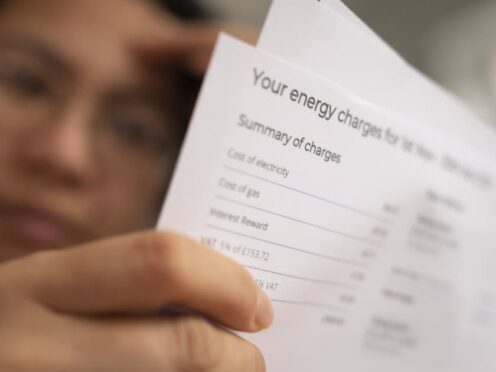
Stress around being able to pay high energy bills has caused illness and work absence, according to research for the Women’s Institute (WI).
The organisation said bigger bills and debt are fuelling a women’s mental health crisis.
More than one in 10 women (14%) said they had been been in energy debt in the last six months, its research suggested.
Of these, almost a fifth (19%) suffered sleepless nights as a result while nearly a third (29%) said they felt worried about paying their bills.
Polling firm Opinium was commissioned by campaign collective Warm This Winter for the WI to interview some 2,000 people aged 18 and older across the UK in March, 1,030 of whom were women.
The research, published during Mental Health Awareness Week, found that of those who had recently been in debt due to energy costs, 9% said it had made them ill, with 6% missing work because of stress.
The findings also suggested that 15% of women were either considering or had skipped meals to make ends meet, one in eight had considered relying on foodbanks and 14% had given up hobbies, which the WI said can in turn affect someone’s mental health.
Some 60% of women said 2023 had been a more difficult year than 2022, a statistic the WI described as “depressing”.
Melissa Green, chief executive of the National Federation of Women’s Institutes (NFWI), said: “Our research shows that the cost-of-living crisis deeply affects women, who often take on the mental load of running a household on top of their jobs.
“We all know and feel the financial impact, but it’s desperately worrying to see women skipping meals, cutting back on essentials, or borrowing just to make ends meet.”
Warm This Winter, a group of 50 charities and campaigners calling for a fair energy system, said the survey findings show “women can see that the UK’s energy system is broken and want long-term solutions” like well-funded insulation and renewable energy schemes “that will end the vicious circle of sky-high bills”.
Simon Francis from the End Fuel Poverty Campaign, said: “People have spent over three years facing sky-high energy bills and are no longer prepared to put up with increases in their bills to line the pockets of an energy industry which has made billions from the energy costs crisis.
“What people want to see are a mixture of long-term solutions to fix Britain’s broken energy system and short-term support for those who need extra help with their bills.”
A Department for Energy Security and Net Zero spokesperson said: “We recognise people are struggling with their bills and would encourage anyone in that situation to speak to their supplier.
“We are spending £108 billion between 2022 and 2025 supporting households with their bills, have cut National Insurance from 12% to 8% for 27 million working people, increased the National Living Wage, worth £1,800 to a full-time worker, and raised benefits by 6.7%.
“And all this comes as the energy price cap has fallen to its lowest level in two years, 60% below its peak.”

Enjoy the convenience of having The Sunday Post delivered as a digital ePaper straight to your smartphone, tablet or computer.
Subscribe for only £5.49 a month and enjoy all the benefits of the printed paper as a digital replica.
Subscribe